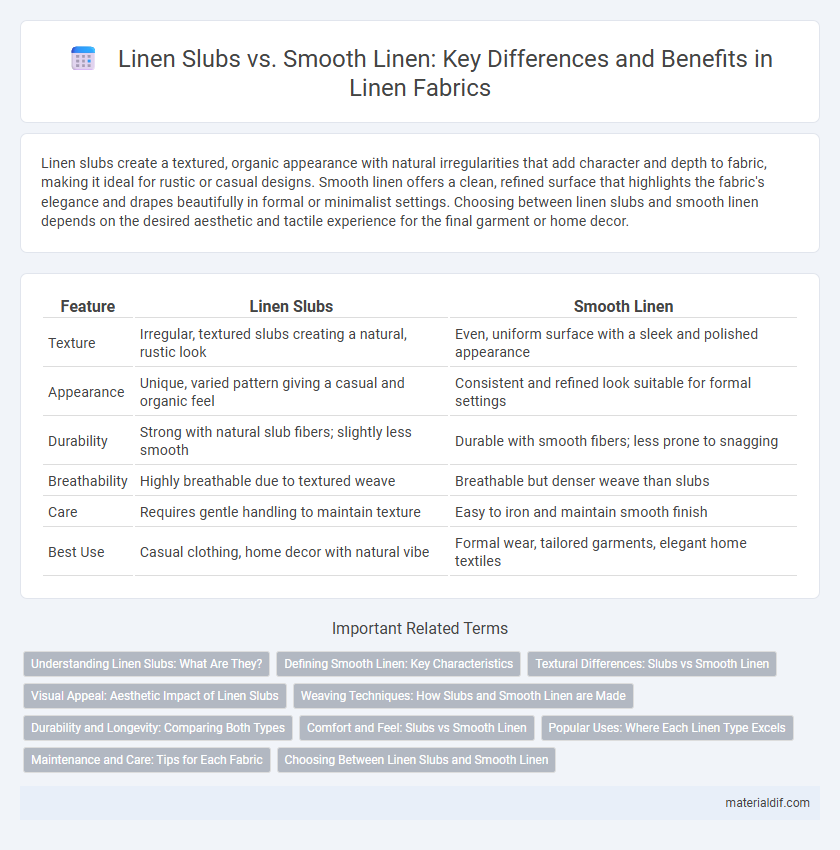Linen slubs create a textured, organic appearance with natural irregularities that add character and depth to fabric, making it ideal for rustic or casual designs. Smooth linen offers a clean, refined surface that highlights the fabric's elegance and drapes beautifully in formal or minimalist settings. Choosing between linen slubs and smooth linen depends on the desired aesthetic and tactile experience for the final garment or home decor.
Table of Comparison
| Feature | Linen Slubs | Smooth Linen |
|---|---|---|
| Texture | Irregular, textured slubs creating a natural, rustic look | Even, uniform surface with a sleek and polished appearance |
| Appearance | Unique, varied pattern giving a casual and organic feel | Consistent and refined look suitable for formal settings |
| Durability | Strong with natural slub fibers; slightly less smooth | Durable with smooth fibers; less prone to snagging |
| Breathability | Highly breathable due to textured weave | Breathable but denser weave than slubs |
| Care | Requires gentle handling to maintain texture | Easy to iron and maintain smooth finish |
| Best Use | Casual clothing, home decor with natural vibe | Formal wear, tailored garments, elegant home textiles |
Understanding Linen Slubs: What Are They?
Linen slubs are natural, textured irregularities or thicker yarns woven into the fabric, creating a distinctive, rustic appearance that highlights linen's organic character. These slubs enhance breathability and softness, making slub linen ideal for casual, relaxed home textiles and apparel. Smooth linen, by contrast, features a more uniform weave with minimal texture, offering a sleek look preferred for formal garments and refined interior decor.
Defining Smooth Linen: Key Characteristics
Smooth linen features a finely woven texture with minimal irregularities, providing a sleek and uniform surface ideal for elegant apparel and home textiles. Unlike linen slubs, which showcase natural thickness variations for a rustic, textured appearance, smooth linen emphasizes consistency and softness. Its refined weave enhances durability and offers a polished finish, making it a preferred choice for contemporary fashion and upscale interior decor.
Textural Differences: Slubs vs Smooth Linen
Linen slubs feature irregular, textured fibers that create a natural, tactile surface with visible nubs, offering a rustic and organic appeal. Smooth linen is finely woven for a consistent, even texture, providing a sleek and polished look ideal for refined clothing and home textiles. The choice between slub and smooth linen impacts both aesthetic and functional qualities, influencing breathability, softness, and overall fabric character.
Visual Appeal: Aesthetic Impact of Linen Slubs
Linen slubs create a unique visual texture characterized by irregular, tactile nubby spots that enhance the fabric's natural charm and depth. This textured appearance adds an artisanal, rustic aesthetic to garments and home textiles, making each piece visually distinctive and rich in character. Smooth linen, by contrast, offers a sleek, uniform surface that highlights crisp lines and a refined elegance but lacks the dynamic visual interest provided by slubs.
Weaving Techniques: How Slubs and Smooth Linen are Made
Linen slubs are created through an uneven weaving technique where thicker, irregular yarns are intentionally left in the fabric, giving it a distinctive textured and organic appearance. Smooth linen, on the other hand, uses finely spun yarns woven tightly in a consistent pattern, resulting in a flat and sleek surface ideal for refined textiles. The choice of weaving technique affects the linen's tactile quality, durability, and aesthetic appeal, catering to different preferences in home decor and fashion.
Durability and Longevity: Comparing Both Types
Linen slubs feature intentional irregularities in the yarn, providing a textured surface that can enhance durability by disguising wear and tear over time. Smooth linen, with its tightly woven fibers, tends to resist abrasion better, promoting longer lifespan in high-use scenarios. Both types offer exceptional longevity compared to other fabrics, but smooth linen generally maintains structural integrity longer under frequent washing and heavy use.
Comfort and Feel: Slubs vs Smooth Linen
Linen slubs feature intentional irregularities and thicker yarns, providing a textured, tactile feel that enhances breathability and a relaxed comfort ideal for casual wear. Smooth linen boasts a finer, more uniform weave offering a sleek, soft surface that feels cool and lightweight against the skin, perfect for refined, elegant garments. Both types excel in moisture-wicking and durability, but slub linen offers a more rustic charm while smooth linen prioritizes a polished, luxurious touch.
Popular Uses: Where Each Linen Type Excels
Linen slubs, characterized by their textured, irregular yarns, excel in casual and rustic home decor such as drapes, tablecloths, and cushion covers where a natural, handmade aesthetic is desired. Smooth linen, with its even and refined surface, is ideal for formal garments, bed linens, and fine upholstery that require a polished and sophisticated appearance. Both types offer breathability and durability, but the choice depends on whether texture or sleekness best suits the intended design and functionality.
Maintenance and Care: Tips for Each Fabric
Linen slubs require gentle washing in cold water to preserve their unique textured fibers and prevent fraying, while smooth linen benefits from regular machine washing on a gentle cycle to maintain its even finish. Both fabrics should be air-dried or tumble dried on low heat to reduce shrinkage and fiber damage. Ironing linen slubs at medium heat enhances their natural texture without flattening, whereas smooth linen responds well to high heat ironing for a crisp, polished look.
Choosing Between Linen Slubs and Smooth Linen
Choosing between linen slubs and smooth linen depends on the desired texture and aesthetic for your project. Linen slubs feature irregular, natural fibers that create a textured, rustic look ideal for casual or vintage-inspired designs. Smooth linen offers a sleek, even surface with refined elegance, making it perfect for formal wear and minimalist interiors.
Linen Slubs vs Smooth Linen Infographic

 materialdif.com
materialdif.com